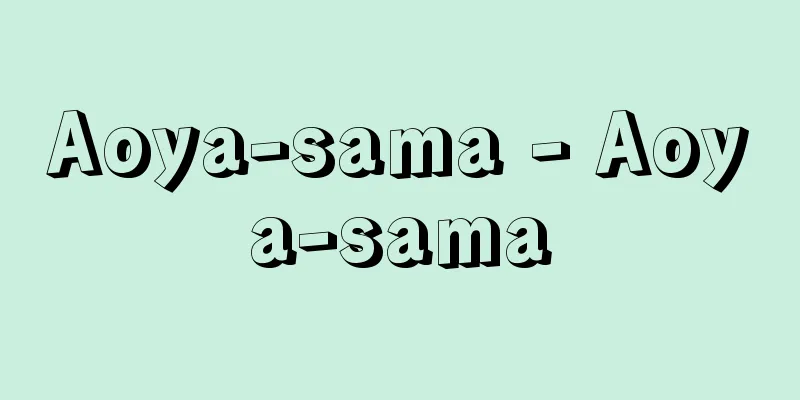Degree - Do (English spelling) degree

|
A unit that indicates the proportion of a quantity. Generally, it means to measure or a ruler, but as a unit it is used for various quantities such as angles, temperature, and the refractive index of glasses. The English word originates from the Latin "wooden steps," meaning steps or steps. Strictly speaking, a word indicating the content of the unit, such as "○○ degrees," should be added, but when the content of the unit is known, it is often omitted and the number is simply expressed as the degree. [Koizumi Kesakatsu] angleA quarter of a circle divided into 90 equal parts. One circumference is 360 degrees. It is expressed by adding a ゜ to the right of the number. [Koizumi Kesakatsu] temperatureTemperature is expressed in degrees Celsius (℃), degrees Fahrenheit (≈℃), or degrees Celsius (≈℃). [Koizumi Kesakatsu] specific gravityThe specific gravity of a liquid is usually expressed relative to water at 4°C, but the various scales devised to put evenly spaced marks on a floating scale are also often expressed in degrees, such as heavy Baume degree, light Baume degree, sake meter degree, API degree, and Twaddell degree. [Koizumi Kesakatsu] Alcohol contentFor alcoholic beverages, degrees are the volume percentage of alcohol in a mixture of alcohol and water at a temperature of 15°C. [Koizumi Kesakatsu] Water hardnessOne French degree is 1 part calcium carbonate per 100,000 parts of water, one British degree is 1 part calcium carbonate per 7,000 parts of water (e.g., 1 grain per gallon), one German degree is 1 part calcium oxide per 100,000 parts of water, which is equivalent to 17.8 parts calcium carbonate per million parts of water. [Koizumi Kesakatsu] The refractive power of glassesThere are units of diopter and zoll, but it is often simply called degree. Diopter is the reciprocal of the vertex distance on the image side of the glasses expressed in meters. A lens with a focal length of 1 zoll (an old German unit of measurement, about 3 centimeters) is called 1 degree, and one with a focal length of 2 zolls is called 2 degrees. [Koizumi Kesakatsu] TurbidityThis refers to the case where 1 milligram of white clay is contained in 1 liter of pure water. In Japan, the turbidity of tap water is permitted up to 1 degree. [Koizumi Kesakatsu] Source: Shogakukan Encyclopedia Nipponica About Encyclopedia Nipponica Information | Legend |
|
ある量の割合を示す単位。一般に計るとか物差しの意であるが、単位としては角度、温度、眼鏡の屈折度など各種の量に用いられる。英語の語源はラテン語の「木の階段」で、段階とか歩度の意味である。正確には○○度と、単位の内容を示すことばをつけるべきであるが、単位の内容がわかっている場合はそれを省略して、単に数値に度をつけて表す場合が多い。 [小泉袈裟勝] 角度円の4分の1を90等分したもの。1円周は360度である。数字の右肩に゜をつけて表す。 [小泉袈裟勝] 温度温度の目盛りによって摂氏度(℃)、華氏度()、列氏度()で表す。 [小泉袈裟勝] 比重液体の比重は普通4℃の水を標準にして表されるが、浮き秤(ばかり)に等間隔の目盛りをつけるために考案された各種の目盛りも度で表すことが多い。重ボーメ度、軽ボーメ度、日本酒度、API度、トワッデル度などがある。 [小泉袈裟勝] 酒精度アルコール飲料では、温度15℃のもとでのアルコールと水の混合液中におけるアルコールの体積百分率を度とする。 [小泉袈裟勝] 水の硬さ1フランス度は水10万中に1の炭酸カルシウムを、1イギリス度は水7000中に1(たとえば1ガロン中に1グレーン)の炭酸カルシウムを含む場合をいう。1ドイツ度は水10万中に1の酸化カルシウムが含まれていることを表し、水100万中に17.8の炭酸カルシウムが含まれていることに相当する。 [小泉袈裟勝] 眼鏡の屈折度単位にディオプトリーdioptoryやツォルzollがあるが、単に度と使う場合が多い。ディオプトリーは、眼鏡の像側の頂点距離をメートルで表した数値の逆数で示す。ツォルは、レンズの焦点距離が1ツォル(ドイツの古い単位で約3センチメートル)のものを1度、2ツォルのものを2度という。 [小泉袈裟勝] 濁度1リットルの純水中に白陶土1ミリグラムを含む場合をいう。日本では上水道の濁度は1度まで認められている。 [小泉袈裟勝] 出典 小学館 日本大百科全書(ニッポニカ)日本大百科全書(ニッポニカ)について 情報 | 凡例 |
Recommend
Nakamura Sojuro
Year of death: October 8, 1889 Year of birth: Temp...
Oliver Wendell Holmes
1841‐1935 American jurist. Born in Massachusetts. ...
Vsevolod Emil'evich Meyerhol'd
Russian director. Born in Penza to a German-Jewis...
Kiyohara Kiyohira - Kiyohara no Kiyohira
A military commander in the late Heian period. A p...
Ima Shinmei - Ima Shinmei
A Kyogen play. A couple opens a teahouse to attrac...
Ibn Faḍlān
A member of the mission sent by the Abbasid caliph...
Red Jungle Finch - Red Jungle Finch
…The front neck and chest are also reddish brown ...
Oyashiki Hokou - House servant
...The Ogasawara school, established during the M...
Vaiyākaraṇa (English spelling)
…A major Indian school of grammar and linguistic ...
Farmer soldier - Nouhei
They were established by the shogunate and variou...
Korean - kankokugo
〘 noun 〙 The national language of the Republic of ...
(R)I Che‐hyŏn
1287‐1367 A Goryeo (Korean) civil servant and scho...
Masaaki Ishihara
Year of death: 7th January 1821 (9th February 1821...
Katsura Kogoro
The former name of Kido Takayoshi, a politician fr...
Muscle spasticity
A state of increased muscle tone. In muscle spasms...









